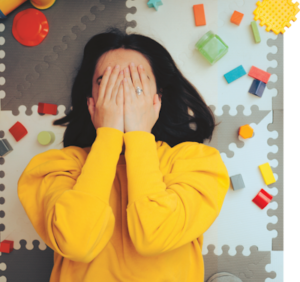Parental Guilt and Shame
David Palmiter, PhD, ABPP
Download PDF
 I’d like to begin this important topic with an assertion: We engaged parents are crazy people. Every. Single. One. Of. Us. Our lunacy derives from the intense love we have for our children.
I’d like to begin this important topic with an assertion: We engaged parents are crazy people. Every. Single. One. Of. Us. Our lunacy derives from the intense love we have for our children.
I remember my first experience of this. I had a hard time drawing breath and felt like I was breaking apart on a cellular level as my eldest suckled on my pinky immediately after her birth. Other loves in my life felt like being waist deep at the ocean on a nice day. I could stand against the next wave, swim with it or just float—my choice. However, my love for Morgan felt like a rogue wave that took me, knees over elbows, wherever it would.
This kind of love can make us SUPER protective, SUPER anxious, SUPER proud and, yes, SUPER guilty and ashamed. If mighty love, and our resulting craziness, sets the stage, what causes the regular self-reproach (assuming our mistakes don’t rise to the level that would concern a child protective services worker)? I believe there are at least four contributing factors: unrealistic expectations for our parenting, unrealistic appraisals for our responsibility, our consumption of social media, and deficits in our self-compassion.
Unrealistic expectations for our parenting
I quip to the parents in my practice: if you parent the way you plan to 51% of the time, you’re at the head of the class! Of course, I’m pulling the 51% number out of my ear, but the point is a sound one: We all screw up continuously.
There is so much on us as parents and the demands only appear to be rising. Moreover, we tend to overestimate the consequences of our mistakes. For example, research indicates that we parents are shepherds not sculptors when it comes to parenting. Theories in psychology suggesting that children’s personalities are fashioned predominantly by the quality of their parenting, had to be authored by men who weren’t around babies very much. Anyone with regular access to newborns can see the obvious truth: infants are very different from each other long before any parent has had the chance to mess them up.
Does environment interact with genetics to determine outcome? Of course, yes. Moreover, our shepherding is hard and critically important work. However, our impact is not to the extent that we parent-lunatics often imagine.
Moreover, the quality of parenting does not cause or cure ADHD.
Unrealistic appraisals for our responsibility
Little children think magically. Divorcing parents are surprised when their five-year-old believes that he (the five-year-old) is the cause of the divorce. They wonder, “Where could he have ever gotten that crazy idea?” We forget that we were believers in a magical world at that age also (see Selma Fraiberg’s classic book, The Magic Years, for example).
Part of this way of thinking is to imagine that we are all-powerful. If someone is upset with me, it automatically means I did something wrong. If someone I love is hurting, I automatically believe that I have the power and responsibility to fix it. If I took more prenatal vitamins my child wouldn’t have ADHD. All of us adults have a little child inside of us who thinks magically; the size of this voice is generally associated with the overall health of our childhood. The more I experienced abuse, neglect, or trauma as a child the larger this magical voice, especially if I haven’t done any therapeutic work to get peace and perspective about those experiences. This also happens when someone goes for years crucifying themselves in their mind’s eye for the consequences of having untreated ADHD.
Magical thinking is also at the core of codependency. This is the idea that one person has responsibility for another person’s thoughts, feelings, behaviors, and outcomes. It’s a little easier to see this magical way of thinking when we observe it in a couple: they both buy into the idea that if the husband feels bad it automatically means that his wife has failed him. I watch Shark Tank, so I’d never start a t-shirt company. But, if I did, my first t-shirt would read, “Relationships are terrible medicine.”
Let’s say you’re an evil scientist who wants to make someone else feel chronically sick. It’s a simple formula: give that person a sense of responsibility for something important over which they do not have control. For example, if someone convinced me that I alone can fix childhood hunger in America, it would not be long until I’d be in a state of maximum stress and shaming self-talk. Easy to see that, right? But it may be less easy to recognize when we parent-lunatics feel overly responsible for what our children think, feel, and do, as well as their outcomes, or when we believe that our child’s suffering automatically means we have failed as a parent.
When magical thinking is added on top of crazy love, a perfect storm exists for parental guilt and shame.
Social media
If we weren’t already disposed to guilt and shame, misunderstanding social media can also get us there. Comparing our insides with other people’s outsides will do that. We strive for these positively inflated images, videos, and stories. One of my former clients called it trying to live a “snow globe life.” Our little children—that live inside of us—think that this is possible, and that, my lovely readers, is cray-cray. I refer to this belief system as “Clark Griswold Syndrome,” after the National Lampoon character who repeatedly gets frustrated in realizing his snow globe expectations for family events. You want to see the contrast between the social media world and real life? Just observe the comings and goings of families at a photography studio in a chain store.

There’s one picture I show in my presentations of a beautiful family picture that’s been photoshopped into a snow globe. What it doesn’t show is that the family blew into the studio like a cyclone, fifteen minutes late, for their appointment because their dog, that they planned to have in the photo shoot, had diarrhea in the car on the drive over. This meant that a close family friend had to stay with the dog and the dog could not be in the picture. Moreover, the mom was mad at the dad, who came separately with their youngest of three, for forgetting the youngest’s matching shoes she had special-purchased for all the children to wear. “I did everything for this! I only asked you to remember her shoes. That’s it! But you couldn’t do that could you?! Have you taken your *&^% medicine today?!” Then, in the ensuing ruckus at the store the dad spilled coffee on his khaki pants, which meant the youngest had to sit on his lap to hide the stain.
After the pictures were done, the parents argued about which pictures to purchase and whether they still had time to go see the latest Disney film (the mom said under her breath: “if I get to do one thing today it’s going to be to see that *&^% princess movie!”). Moreover, the dad later had to return because he left his car keys at the store. Chaos-chaos-chaos-snap the perfect pic-chaos-chaos-chaos.
Highroad living in family life is a bumbling and tumbling cacophony of joy, tears, sadness, laughter, meaning, exhaustion, and considered chaos whether ADHD is present or not. This is as good as it gets, which can be spectacularly amazing if we can see the truth of things!
Deficits in self-compassion
I believe we have broad and deep deficits in self-compassion in our culture. To begin this reflection, I’d recommend that you take Dr. Kristen Neff’s self-compassion test, which she makes available for free on her website (self-compassion.org).
Here’s another five-step process for assessing your self-compassion:
Step 1: Recall the last time you screwed up on a self-improvement project. Maybe you’re trying to be sober, and you tied one on. Or maybe you’re trying to not yell at your spouse, and you lost it. Or maybe you’re trying to lose weight, and you binged on ice cream. Close your eyes and bring a painful lapse to mind.
Step 2: Focus on your self-talk. What are you saying to yourself about the lapse?
Step 3: Imagine an adult who you love a ton is sitting next to you.
Step 4: Imagine that this loved one (e.g., spouse, best friend, future child grown up to be an adult), tells you they feel bad about a lapse they’ve committed that is just like the one you’re considering regarding yourself.
Step 5: Make yourself say, out loud, what you’ve been saying to yourself—but to your imagined loved one. I know it feels weird to do this, but make yourself say the whole thing out loud.
If you’re harsh with yourself, you’ve already noted the point of this exercise: If it doesn’t belong on your lips directed toward a loved one, it doesn’t belong in your mind directed at yourself. A good next step would be to work through the exercises in Dr. Neff’s book Self-Compassion: The Proven Power of Being Kind to Yourself.
Here are just a few closing thoughts for those of you who struggle with parental guilt and shame:
- Guilt is “I screwed up.” Shame is “I’m a screw-up.” Shame is toxic and represents distorted thinking. Alternatively, and in a context of being generally self-compassionate, rational guilt can springboard us into transformative action (examples include psychotherapy, spiritual direction, a good self-help book).
- The more we are compassionate and loving toward ourselves the more we are those things toward others and vice versa. I often hook my parents into doing challenging self-compassion work by asserting that it stands to make them a more compassionate parent.
- When being self-compassionate or compassionate toward others, exhaust all empathy before considering reassurances or fixes. Reassurances or fixes, especially of the unsolicited sort, put before empathy, can often have the exact opposite intended effect.
- Ask yourself these two questions: Do you love your child more than your life? And, at every step did you do your best, even if you screwed up? If the answer to both is “yes,” I hope you’ll offer yourself some lovingkindness instead.
 David Palmiter, PhD, ABPP, is a board-certified clinical psychologist and the clinical director at the Chesapeake Center in Bethesda, Maryland, one of the largest ADHD specialty clinics in the country. He is also professor emeritus at Marywood University in Scranton, Pennsylvania, and a fellow of the American Psychological Association, the Pennsylvania Psychological Association, and the American Academy of Clinical Psychology. A past president of PPA, he serves as an examiner for the American Board of Professional Psychology, and he has served on the board of directors of two local CHADD chapters. The author of over three dozen professional publications (including two books on promoting resilience in youth), he has completed over 250 continuing education presentations for mental health professionals across the country, partnered on over 300 media projects for audiences around the globe, and received numerous awards for his work. Dr. Palmiter currently serves on CHADD’s board of directors and on the editorial advisory board for CHADD’s Attention magazine.
David Palmiter, PhD, ABPP, is a board-certified clinical psychologist and the clinical director at the Chesapeake Center in Bethesda, Maryland, one of the largest ADHD specialty clinics in the country. He is also professor emeritus at Marywood University in Scranton, Pennsylvania, and a fellow of the American Psychological Association, the Pennsylvania Psychological Association, and the American Academy of Clinical Psychology. A past president of PPA, he serves as an examiner for the American Board of Professional Psychology, and he has served on the board of directors of two local CHADD chapters. The author of over three dozen professional publications (including two books on promoting resilience in youth), he has completed over 250 continuing education presentations for mental health professionals across the country, partnered on over 300 media projects for audiences around the globe, and received numerous awards for his work. Dr. Palmiter currently serves on CHADD’s board of directors and on the editorial advisory board for CHADD’s Attention magazine.
FOR MORE INFORMATION
Kristen Neff, PhD. Self-Compassion: The Proven Power of Being Kind to Yourself. (William Morrow, 2015).
Dr. Neff’s Self-Compassion Test | https://self-compassion.org/self-compassion-test/
Other Articles in this Edition
The Impulsive Friendship Cycle
The State of ADHD Advocacy: Progress, Challenges, and How You Can Take Action
How to Help Your Daughter Manage Executive Dysfunction
Seeing ADHD in Full: Permission as a Foundation of ADHD Care
Tired But Wired: Sleep and ADHD
